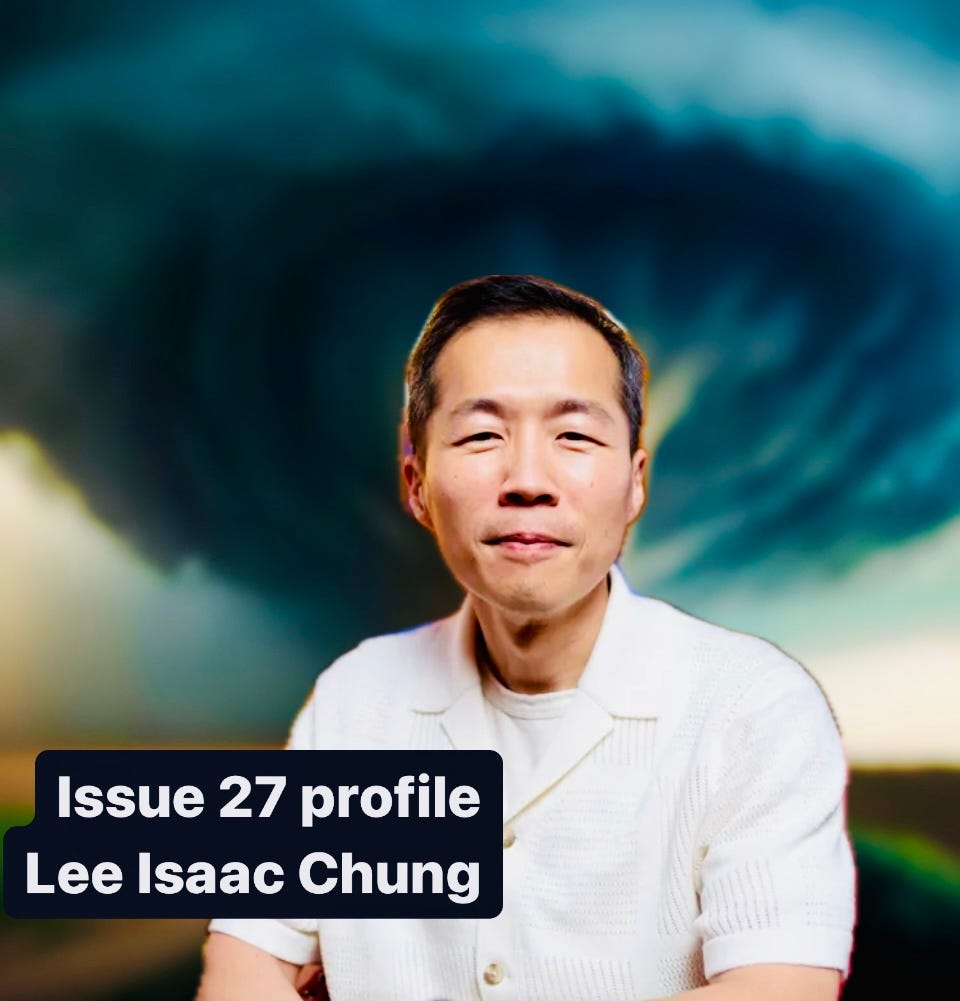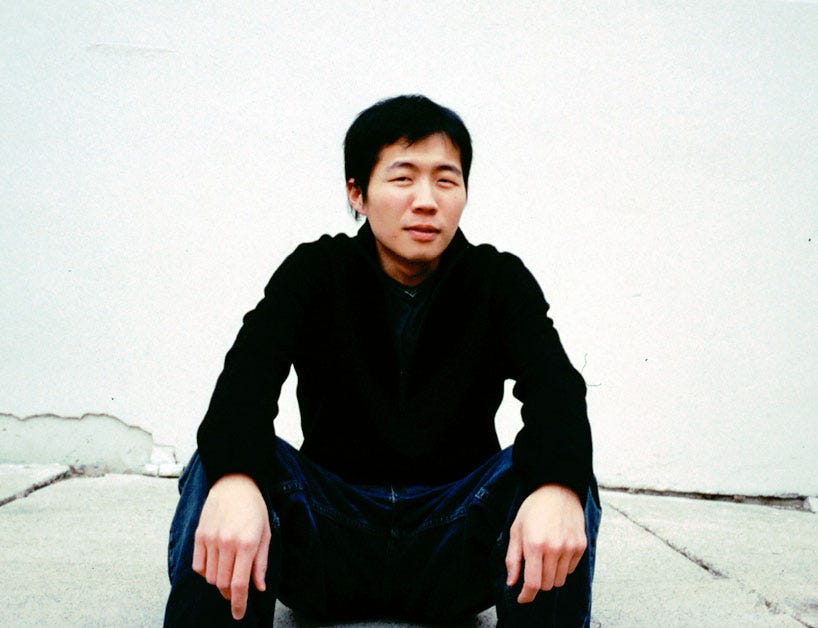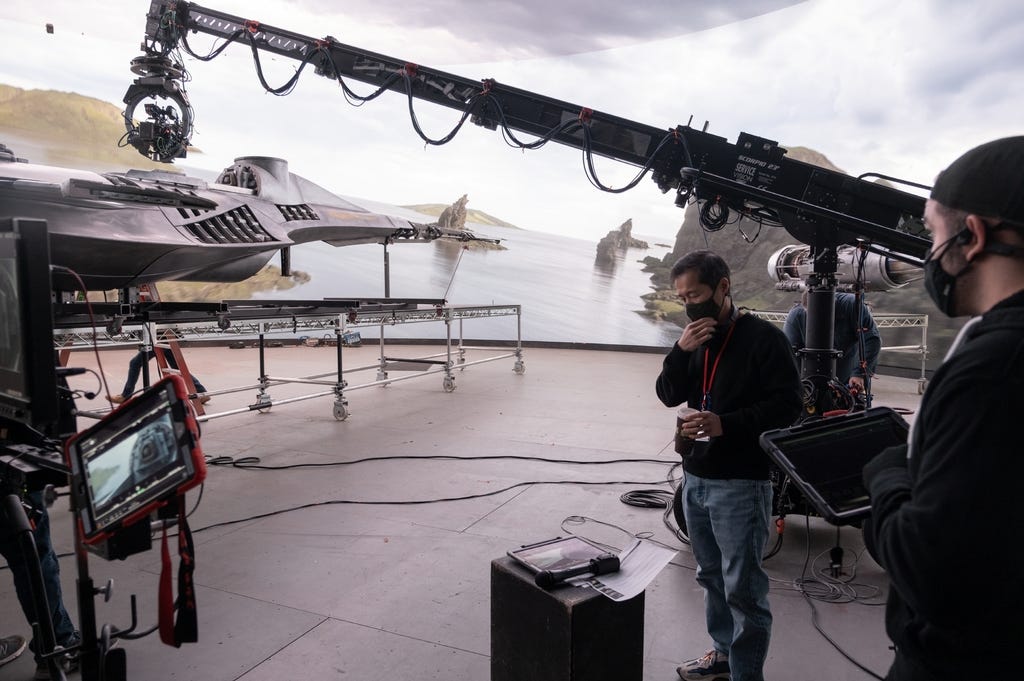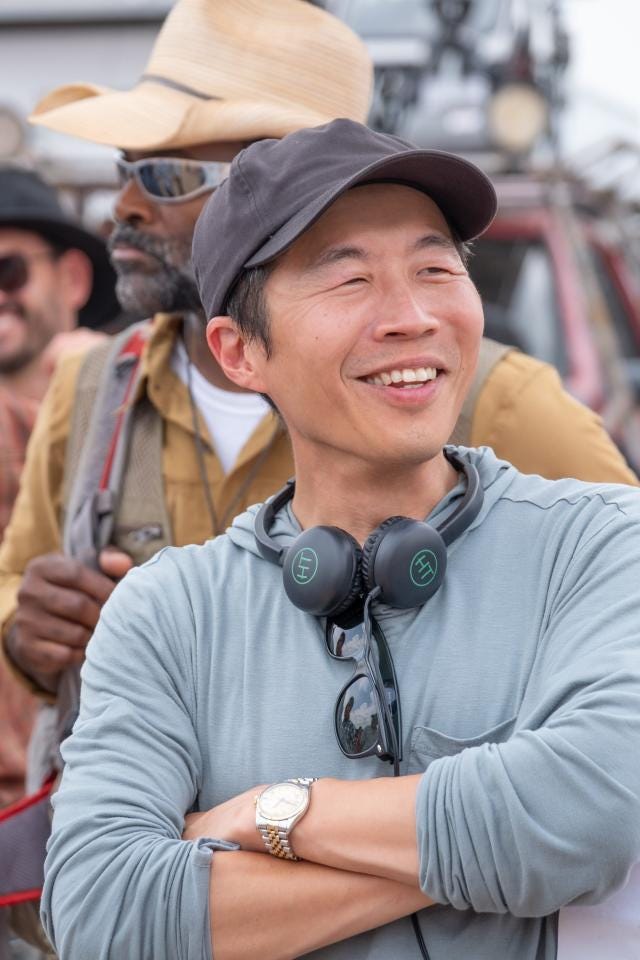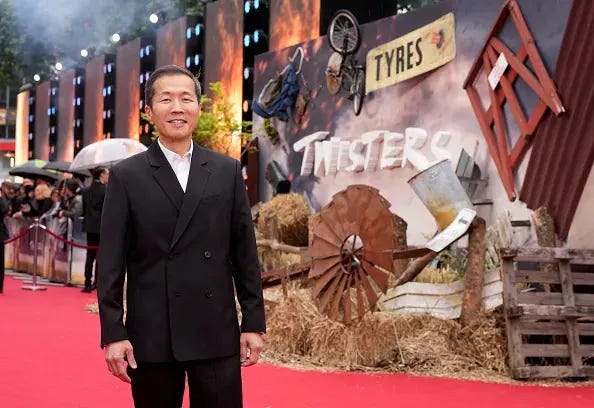Asian A.V. Club newsletter #27: Lee Isaac Chung
Oscar nominated director Lee Isaac Chung talks to us about making the behemoth summer smash Twisters, the celebration of America through his films and why you shouldn't mention Disney World to him.
At first glance, it may seem that Oscar-nominated director Lee Isaac Chung has taken a big leap from his intimate semi-autobiographical film Minari to the F5 mayhem seen on screen in Twisters, but the two films are more connected than they appear to be (more on that below). After capturing hearts with his tale of a Korean-American family's pursuit of the American dream, Chung took on the unexpected turn to indulge his inner-Star Wars fan boy by directing episodes of The Mandalorian and the upcoming Skeleton Crew. That primed him for his biggest project yet: a reboot of the iconic 1996 disaster movie Twister, aptly renamed… Twisters!
We got to talk to Chung about his inspiration for making films in the first place, THAT notorious Disney World experience, his approach to creating this successful monster of a movie, and catch him a tad contemplative as he plans what to do next.
Asian A.V. Club: Do you remember your ‘a-ha’ moment where you were sitting front of a movie screen and decided this was the world that you wanted to be pursue as a career?
Lee Isaac Chung: It was actually when I was in college. I was an ecology, evolutionary biology major and I was thinking I would go to medical school. At the time, I was doing a lot of genetics research in laboratories, making money on the side. During my senior year, I found out that I had not taken an arts requirement course that I needed to do to fulfill my requirements to graduate. And I looked at the course manual, and I saw filmmaking.
Now, when I was a kid, I loved to make videos with my friends, so I thought this would be fun to do. And it was taught by this filmmaker, Michael Roemer (The Plot Against Harry, Nothing but a Man), who is an incredible American independent filmmaker, who made these amazing films in the 1960s. And he basically gave us a camera and told us to make a short film every week. These were often just 30 seconds to maybe two minutes, and we had to shut off our brains and just go and do something real quick. And I fell in love with that, like, I couldn't stop doing it. My videos were increasingly becoming like five minutes, six minutes, and just stuff that you should not be making in one week while you're trying to manage this other heavy course load. All my grades for everything else were going terribly because this one class was the thing, I was devoting everything to.
I was also working in a lab hating every moment that I was there, because for me, it was just becoming very boring. But when I was filmmaking, the time would pass. And I wouldn't even know that I had stayed up all night. When that was happening, I just felt I want to do that for the rest of my life. I want to work on this thing that I can get lost in. And that was really the beginning.
I tried to go to film school and couldn't get in anywhere. Every place rejected me because obviously this biology major only had 30 second movies to show. (laughs) So, I spent a year making a short film and got into University of Utah. It was one of three schools that took me, and it was very cheap to go there, so I went there. And that was it. I fell in love. I was watching tons of movies and getting brushed up on the history of cinema. And as soon as I graduated, I just set out and started making films on my own. So that's really how it started.
Asian A.V. Club: I gotta hear about ‘the talk’ with your parents.
Lee Isaac Chung: It was at Disney World.
Asian A.V. Club: NO!!! Really?
Lee Isaac Chung: My sister organized this trip to Disney World for some reason that winter and I decided to tell them there. I remember my sister and her husband, and then my mom and dad. So, there's two and two and then me, the fifth wheel in this situation. When I told them, they were very upset. And every time we stood in a line for an hour to get into a ride, they would talk about how I'm screwing up my life. And then we'd have to funnel into the ride and sit two by two and I'm the odd man out just sitting next to some stranger for two minutes and then it's back to them telling me you really need to get back to your plans to go to med school and all that stuff. So, it's hard for me to go to Disney World.
Asian A.V. Club: That is the best ‘the talk’ story we’ve had so far. Thank you! Now, I read somewhere that Minari stemmed from you writing a list of memories which then expanded into the autobiographical film. Can you talk a little about that process? And then prepping for something like Twisters, did making a list come in handy?
Lee Isaac Chung: (laughs) Oh yeah, I did make a list in some sense. With Minari, I made a list of maybe 80 memories, and just created a story out of those memories. I reordered them, and then I flushed them out. I saw the connections happening between characters and let that story go away from my memories into something that's much more fictional. So that was the basis of that film.
I guess, with (Twisters), it's interesting you say that. When I first set out, I realized I needed to help my VFX department really understand what I'm envisioning. So, I went on this massive treasure hunt for YouTube videos that have actual tornadoes, and I organized our script, scene by scene according to various tornadoes. They were all labeled with the level of rain, or the nature of the tornado, this is what it looks like, we will use this angle, things like that. So, I did have a list and that became a good template for all of us in the beginning to figure out visually what this movie was going to look like recreating those storms and tornados.
Asian A.V. Club: As someone who lives in a big city, it’s hard to remember a US outside of what you see in the news. But something about your film and its celebration of this beautiful rural space, made me forget for a few hours and actually appreciate this country more.
Lee Isaac Chung: I love that. My experience when I went to college, coming from Arkansas, from the Ozark Mountains, I did feel like people were often not getting right what happens in those environments. I also felt like I was kind of running from where I had come from. That upbringing and who I was. In a way Minari and this movie have been chances for me to celebrate things that I remember that are good and that I love about that place. I still have family and friends over there, and my picture of America feels more informed by that, rather than the very polarizing message that is often put out. Which unfortunately, I think is a very profitable message. That message of things that keep dividing us and riling us up and causing outrage on both sides. I've had the privilege of being able to be in various spaces amongst very different people. And for the most part, we're all the same. It's really great to be able to show it through love and hope, positivity. And that's kind of what I hope to do.
Asian A.V. Club: Did your family know how to deal with tornados when you first arrived from Korea?
Lee Isaac Chung: Oh no. We didn't know what to do when we first moved to Arkansas. When we first moved to that area, a tornado was coming through and I remember we didn't know what to do cause we lived in a trailer home. It always caused a bit of a panic for us. But when a lot of natural disasters and things are just the general texture of a place, you're gonna start ignoring it and just treating it as a whatever thing. (laughs) Which is definitely what my family did a couple of years into our stay there.
Asian A.V. Club: I love how you shoot on film because it looks great on the big screen. Because it’s a disaster film, I was curious about just how organized you have to be to shoot as few takes as possible, since film is so expensive?
Lee Isaac Chung: Well, I kind of started off on film. My first two features were on film, and the discipline of shooting that way stayed with me. With Minari, I don't think I ever did more than three takes. There's one scene I did 13, I still remember that one because it was a line that was really difficult. Even though with The Mandalorian and Skeleton Crew I was working on digital, but I didn't do many takes. That's just generally the way that I work. That sense of being conservative with using the footage and with time in your day, and all of those things and having a game plan.
So, training on film was actually a really good discipline for me to develop a little bit better of a nervous energy about making sure that we're all prepped for everything. That I'm also prepped, and I know how I want to cover a scene and how I'm going to do it in a way that is efficient. So that we're not just shooting a bunch of angles and trying to figure it out. And we didn't have a lot of time to shoot this movie, so it helped.
Asian A.V. Club: You can tell on screen that there’s this collective love from the cast and crew for this film. It feels like everyone bonded together to support you in making this movie and I bet you had a few warm fuzzy moments in the process.
Lee Isaac Chung: Yeah, there's no way I could have succeeded without all of their support, and especially veterans who were on this project. The heads of department, I was able to rely on them a lot. They were not just wanting me to succeed, they took ownership of the project. And that's always such a wonderful thing when that happens because it becomes infectious. And that’s where a lot of the warm fuzzies come from, when you feel that you're working as a family. Everybody's locked in and everybody owns the project. That was really inspiring. We just had our premiere and I saw a lot of our team afterwards at the after party. And there was just so many hugs. It was really wonderful for all of us just to embrace and celebrate what we had done. So, I'm glad that comes through in the screen because we definitely felt it.
Asian A.V. Club: I know you had a bit of a side-hustle as a teacher, just curious, does that skill set to be able to address larger themes and bring it into smaller details extend to the way you are as a director?
Lee Isaac Chung: (laughs) That's a very generous way to look at it, by the way. I really appreciate that. I think being a professor, unfortunately, what it does is it brings out my worst tendency to talk a lot. (laughs) But with directing, I want to listen more. That's something that I hope to do more. What’s really great about being a professor is that you learn how to communicate to people concepts that they need to know to figure out the curriculum or what you're teaching. In the case of directing, you're trying to get them on board with the script. So…Professor-Director…not the best hyphenate. (laughs)
Asian A.V. Club: You’ve said that, especially with Twisters, it was basically you overcoming a fear on this massive level. I’m just curious, if a career is based on challenges and overcoming them, then where will the fear take you next as a filmmaker after this experience? It would seem that you’ve reached a pinnacle for yourself with this one.
Lee Isaac Chung: Honestly, that's a such a great question. And it's a very challenging question. I really don't know what that's going to be. I didn't even know this one was going to come along. I'm just hoping for something like that to happen, where something comes along that's out of my control, and feels like a calling in many ways to something that is going to be transformative.
I've been thinking a lot about legacy and how anyone in this position of being able to make a film of this scale, at the core of things, we all still need to be trying to create good in this world in some way. It's so easy to get lost into ego, into power, into money. I've been wanting to just step away from all this for a bit and reset a little and just figure out what does it mean to be able to use this incredible opportunity I've been given and how do I do something that is creating good. That doesn't mean it has to be very serious.
Like I was geeking out in the archives up at Skywalker Sound, looking at some props that George Lucas had made. I was looking at the original Yoda and I felt, wow, this man has really brought so much joy into this world with the things that he's done. There's something beautiful about this calling of being a filmmaker, to be able to entertain and to bring beauty and joy and almost present a world that you believe should exist to an audience and to lead in such a way like that. I don't think I've figured that out because I'm still in process myself with it.
Asian A.V. Club: You're getting there. Trust us, you bring us joy from all your films, so thank you.
Lee Isaac Chung: No, thank you.
Twisters is showing in cinemas now.





